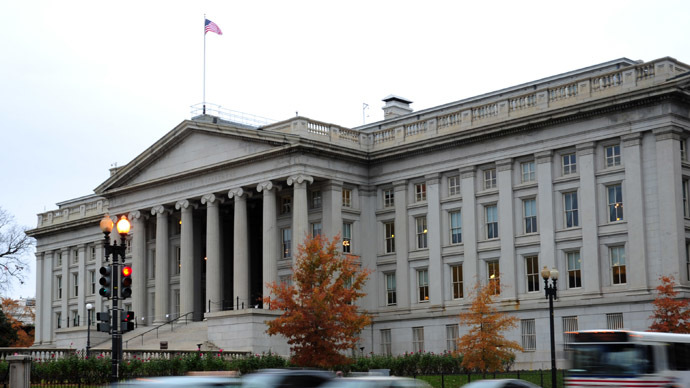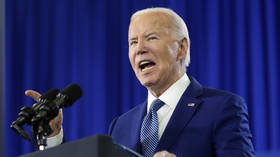How safe is your money? US Treasury says it limits spy access to bank books

While not denying that it allows US intelligence agencies sneak peeks at “suspicious” money transactions by its clients, including those by Americans, the Treasury Department said it sets limits on what the spies may view.
In response to a freedom of information request, the Treasury
released information as to how it allows the National
Counterterrorism Center (NCTC), the primary organization of the
US government for analyzing intelligence on terrorism, to examine
reports that banks create on suspicious or large cash
transactions made by customers.
The partially redacted document, reported by Bloomberg, also
established conditions for intelligence agencies conducting
searches on the Treasury’s database.
“Financial data can be some of the most relevant as to how
people are connected,” NCTC director Matthew Olsen told
Bloomberg. “That’s why it’s vital that we have access”
to the FinCEN database, he said.
US banks keep records on more than 15 million currency
transaction reports annually on the movement of $10,000 or more
into or out of an account, according to FinCEN, a department that
falls under the US Treasury’s Office of Terrorism and Financial
Intelligence (TFI). Meanwhile, financial institutions such as
banks, brokerages and even casinos, file more than 1.5 million
suspicious activity reports each year.
Although the NCTC tracks travel habits, communication records and
other relevant information when investigating possible terrorist
activity, following the money is of primary importance, and has
been used to trace financial moves from people in the US to
terrorist organizations in Yemen or Syria, Olsen said.
“Financial connections are the most binding between
people,” he added. “When we can find connections based
on money, it’s not a smoking-gun piece, but it helps with
analysis.”

Since the terrorist attacks of 9/11, which seemed to fast-track a
huge intelligence foray into the lives of private citizens, many
people have become increasingly concerned as to what sort of
information is being collected on them in the name of security.
Last summer, Edward Snowden, a former NSA
contractor-turned-whistleblower, blew the cover on America’s
worldwide data-collection program, which exposed the Obama
administration to harsh global criticism. Since then, Washington
has been attempting to assure US citizens and foreign allies that
the United States is not the Orwellian nightmare some say it has
become.
10 things we didn’t know before Snowden
A 2010 memorandum of understanding between the Treasury’s
Financial Crimes Enforcement Network (FinCEN) and the NCTC
attempted to address those suspicions by requiring that the spy
agencies strive to retrieve data that pertains only to specific
cases and immediately destroy data obtained “in error.”
“The data we collect is publicly known,” FinCEN Director
Jennifer Shasky Calvery told the news agency. “It’s not raw
data. It’s suspicious, large-cash transactions that meet a
threshold.”
“We think we’ve gotten that balance right, although it is
something we must always be ready to re-examine.”
Last month, European MEPs voted by 544 to 78 in favor of putting on hold many joint EU-US programs, including
one dubbed SWIFT, a financial-record sharing program designed to
track terrorist activity.
The Snowden leaks showed the NSA gained a “back door” entrance
into the SWIFT servers, which revealed the banking details of
millions of European citizens, despite the fact that access to
these financial data had been strictly limited by the Terrorist
Finance Tracking Program (TFTP).














